There are some episodes in which Mad Men gives you everything you hope for; when the drama that can seem to revel in its slow pace and cyclical themes suddenly ups the ante to deliver shock, surprise and – in the words of those Greeks – a bit of good old anagnorisis.
This week's episode was the penultimate one of the season, the "red wedding" slot, and it didn't disappoint. We saw Don Draper at his best and worst, with Peggy Olson sticking one in his gut (an insult this time, rather than a bayonet). We saw Sally Draper reunited with Glen Bishop, indulging in adolescent experimentation. Even the mystery of Bob Benson was dealt with, in the sense that one mystery was replaced with another. There was so much going on that the fact of Ken Cosgrove getting shot in the face turned out to be nothing more than an hors d'oeuvre.
******
"You're a monster." Peggy ends the episode with an insult that confirms what had been apparent but remained unsaid for some time: she is not Don's apprentice, his heir or even his friend.
That it has come to this says much about the position each character is in right now. Don begins the episode topping up his morning OJ with vodka. It's a cycle he's been in since the beginning of the season, exacerbated after he was caught by his teenage daughter having sex with his mistress. Peggy, meanwhile, has been in the company of Ted Chaough, working on her giggling. After their brief kiss, the pair have failed to adequately resolve their feelings for each other, and it resulted in the most egregious of office flirtations. It couldn't last.
It doesn't, thanks to Don pulling off a piece of bravura office theatre in front of aspirin manufacturer St Joseph's. A budget overspend leads to an upset client and an emergency meeting. But the real action is going on beneath the surface; Don leaked the details of the overspend to St Joseph's but then agreed at Ted's behest to back a claim for more cash. He sits in the meeting watching as Ted's pleas for his client to support ambitious but expensive content inevitably fail. He steps in and, for an agonising moment, looks as though he's about to ruin the reputations of his two colleagues. Ted wants this ad for personal reasons, he says, reasons he won't admit in public. Don looks at Ted and Peggy, and slowly they clock what the look is about. Surely he won't?
He doesn't. Instead he spins a yarn about the campaign being Frank Gleason's last great idea. St Joseph's, who are more receptive to emotional arguments that aesthetic ones, acquiesce and add 10k to the budget. Their only provision is that the cast list be cut down.
For Ted and Peggy, what happened is clear. Don wanted to humiliate them both. Driven by his own bitterness, his own failure to build positive human relations, he can't stand to see other people happy. "You hate that he's a good man," Peggy says, and there is another inference to be made, too – that Don hates seeing Peggy doing her best work under another's guidance.
And yet. Don was right about the ad. The cost would have driven away the client. The size of the cast was not only too costly, but diluted the impact of the idea. Too caught up in their excitement, Ted and Peggy weren't making the best decisions for the company.
This is where the complexity that Mad Men allows for in its characters creates superior dramatic situations. All parties, at some point, were in the right. Peggy's creative was good. Don did want to see his colleagues embarrassed. At the same time, only Don's argument saved the campaign. Peggy was unable to take criticism, Ted too keen to pursue the solution that made him most happy. As Don curls into the foetal position on his sofa, we know that Peggy's remark has cut deep, but – in this very instance – was she right to make it?
******
Those of you who read last week's recap will know I owe you an apology. Not for writing "mouse" instead of "rat", but for underestimating the Bob Benson mystery.
When he rubbed his knee against Pete Campbell's, I thought that was it. The secret was revealed. He had kept his sexuality under wraps – big deal. But the secret turns out have been about a tad more than that. The truth is that we know nothing of Bob Benson. In fact, he probably isn't even Bob Benson at all. And when he first made his appearance in the SCDP elevator, he'd just walked in straight off the street.
In this year of Gatsby reinventions, it seems appropriate that Mad Men should have one of their own, except Jay Gatsby is an open book compared to Bob Benson. The truth is exposed by Duck Phillips who, for all his overreaching ambition, is not a fool. Living in fear of being hit upon on work trips to Detroit, Pete asks Duck to take Bob off his hands. Duck conducts due diligence on Bob and finds that nothing about him checks out and no one knows who he is, bar one Gatsby-esque detail – that he acted as a manservant to an ageing merchant banker.
Pete confronts Bob with what he has learned but, in an exchange filled with mutual incomprehension, he ends up giving way. Pete has seen Bob's type before, he says, referring of course to Don Draper, formerly Dick Whitman. "I don't know how people like you do it, you're certainly better at it than I am at whatever I do. But I like to think that I have learned not to tangle with your kind of animal." And so, in fear of what Bob might do were he to be cut loose, and also aware that what he knows now gives him power, Pete keeps Bob on. On one condition: "I'm off limits."
There's a great ambiguity about that line. Does he mean off limits as an amorous exploit, or a professional one? Presumably he's more afraid of the latter now. Indeed, as some of you pointed out last week, he may not even be gay at all. What we are left with is a revelation that reveals nothing. Nothing but a sense that when Bob stops smiling, he's a very different man.
******
The miseducation of Sally Draper continues. After the traumatic events of last week, she has resolved to get as far away from her father as possible, and that means Miss Porter's, the boarding school that was alma mater to Jackie Kennedy Onassis. Having tried and failed to prise out the reasons for her daughter's newfound scholastic enthusiasm, Betty drops Sally off for an overnight visit. Sally is instantly introduced into the world of the mean girls and two of them seek to give her an emotional hazing.
Sally, however, has a trick of her own up her sleeve. And that's Glen. Good old creepy Glen, who crashes in through a dormitory window looking like a Parisian revolutionary and carrying both booze and weed. Within moments he's got everyone high and hit on one of Sally's erstwhile tormentors.
He's not just there to bring good cheer, though. As Sally is inducted into the adolescent world of illicit consumption, she is forced to escape from the attentions of Glen's acquaintance Rollo (he likes to roll). Sally bangs on the door behind which Glen is getting busy. I expected him to ignore her and for Sally to endure another horrible encounter. But no, he emerges, instantly confronting Rollo before wailing on him for his ungentlemanly conduct. With such a to-do, Glenn has no choice but to leave or encounter the authorities (and miss his lift home). He does so, however, looking like one of the good guys. Or, given the state of most of the men in this show, the good guy.
As a postscript, we watch Betty driving Sally home again, Sally having bagged herself a school place. They share a moment and a cigarette together, but as she suggests that her daughter would probably get a beer from her father, Betty gets the bite she was looking for. "My father never gives me anything," mutters Sally, and Betty's eyebrows furrow.
******
Poor old Ken. He hates Detroit, he hates cars and he hates being shot in the face. I'm not sure I've all that much invested in Ken any more. His dreams of being a writer and a better man than his colleagues seem far away, and he feels like a second tier character now. But he does have some good lines this week, as he struggles to recover from his latest traumatic outing with the executives of Chevrolet. "Did I tell you," he spits at Pete, incredulously, "that on the way to the hospital, they tried to stop for lunch!"
This week's notes
Has Bob Benson ever been paid?
As Ted and Don tussle over $35k, Harry Crane is bringing in $8m in TV spend from Sunkist. Another sign of the increasing dominance of TV as America's favourite medium. Not that that stops Don from treating Harry like a junior member of staff.
I would never drink Cranprune.
Time stamps
"See that tree over there? Close your eyes and pretend it's Ralph Nader." Environmentalist, champion of US consumer rights and serial independent presidential candidate (his fourth and latest attempt coming in 2008), Ralph Nader is an enduring figure in American politics. He first made his name campaigning for greater car safety, publishing a book Unsafe at Any Speed in 1965 that led to national legislation the very next year. He had a particularly unpleasant relationship with General Motors, who had spent time and money trying to discredit him. Nader sued GM for invasion of privacy, won $450,000 dollars in damages and forced another change in the law. All of which might help to explain the jibe above.
Richard Nixon was elected to office in 1968 on a pledge to end the Vietnam war. He also ran hard on crime, promising to "take the offensive against the criminal forces that threaten the peace and security of every American". Don is watching an election broadcast that deals specifically with this theme.
Culture club
Peggy's big idea is inspired by the unsettling final scene of Rosemary's Baby, in which Mia Farrow's Rosemary accepts her half-demon child in front of an eerie crowd. A big box office hit, it was Roman Polanksi's final film before the murder of his wife Sharon Tate (to whom other Mad Men characters have been linked this season).
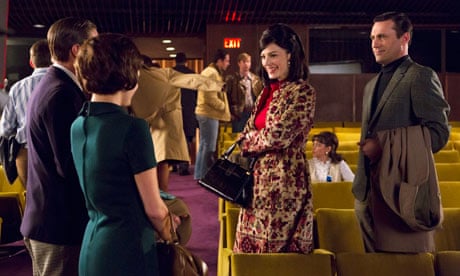
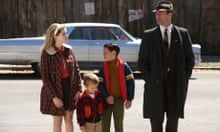

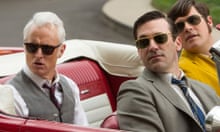
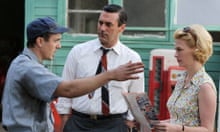

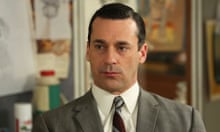
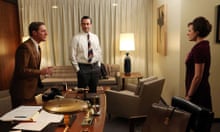
Comments (…)
Sign in or create your Guardian account to join the discussion